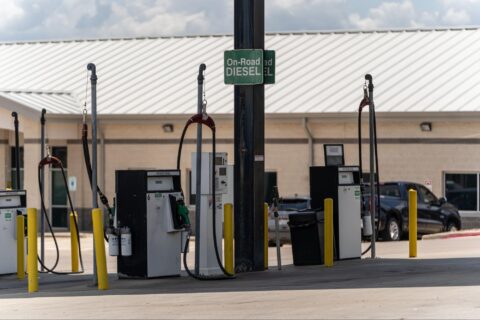Why Clear Diesel’s Higher Cost Compared to Dyed Diesel?
In the world of diesel fuels, understanding the differences between clear diesel and dyed diesel goes beyond their appearances. It involves a complex interplay of factors, including pricing, taxation, regulations, and Diesel fuel legality. In this article, we’ll delve into the reasons why clear diesel typically costs more than dyed diesel and what factors contribute to this disparity.

Overview of Factors Influencing Diesel Fuel Pricing
Diesel fuel pricing is subject to the influence of a multitude of interconnected factors, each playing a distinct role in determining the final cost at the pump. Understanding these fuel pricing factors is crucial for grasping the complexities of diesel fuel pricing dynamics.
- Crude Oil Prices: As diesel fuel is derived from crude oil through the refining process, fluctuations in crude oil prices have a direct impact on diesel fuel pricing. Changes in global oil supply and demand, geopolitical tensions, and economic factors can cause crude oil prices to fluctuate, thereby affecting the cost of diesel fuel.
- Refining Costs: The refining process transforms crude oil into various petroleum products, including diesel fuel. Refining costs encompass expenses related to refining operations, maintenance of refinery infrastructure, and compliance with environmental regulations. Technological advancements, refinery capacity, and energy efficiency measures also influence refining costs, which in turn impact diesel fuel pricing.
- Transportation Expenses: Once refined, diesel fuel must be transported from refineries to distribution centers and ultimately to retail outlets. Transportation expenses encompass costs associated with fuel transportation modes such as pipelines, tanker trucks, and railroads, as well as storage facilities and logistical operations. Distance traveled, fuel efficiency of transportation vehicles, and market conditions affect transportation expenses and contribute to diesel fuel pricing.
Role of Diesel Fuel Taxation and Other Regulations
Government taxes and regulations exert a significant influence on diesel fuel pricing, shaping both the cost structure and market dynamics of the diesel fuel industry.
- Taxation: Federal, state, and local governments impose various taxes on diesel fuel, including excise taxes, sales taxes, and environmental fees. Excise taxes are typically levied on each gallon of diesel fuel sold and vary by jurisdiction. These taxes contribute to government revenue and fund infrastructure projects, transportation initiatives, and environmental programs. Changes in tax rates or policies can directly impact diesel fuel prices, leading to fluctuations in consumer costs.
- Regulations: Regulatory frameworks established by governmental bodies govern aspects of diesel fuel production, distribution, and usage. Regulations may address fuel quality standards, emissions limits, and safety requirements, among other factors. Compliance with these regulations necessitates investments in technology, infrastructure, and operational practices, which can influence diesel fuel pricing. Additionally, regulatory changes or mandates aimed at reducing emissions or promoting renewable fuels may impact the availability and cost of diesel fuel in the market.
Clear Diesel: Higher Cost and Legality
What is Clear Diesel, and Why is it Costlier?
Clear diesel, also known as white diesel or highway diesel, is the standard diesel fuel used in vehicles operating on public roads. It undergoes stringent refining processes to meet quality standards and environmental regulations, resulting in higher production costs compared to dyed diesel.
Compliance with Fuel Regulations
Clear diesel is subject to strict regulations regarding sulfur content, emissions standards, and fuel additives. Compliance with these regulations adds to the production costs, contributing to the higher price of clear diesel.
Benefits and Drawbacks
While clear diesel ensures legality and compliance with environmental standards, its higher cost may pose financial challenges for businesses and consumers. However, the benefits of reduced emissions and engine performance optimization often outweigh the cost considerations for those prioritizing environmental stewardship.
Dyed Diesel: Lower Cost and Legal Restrictions
What is Dyed Diesel, and Why is it Cheaper?
Dyed diesel, also known as red diesel or off-road diesel, is a cost-effective alternative primarily intended for off-road use. It is identical to clear diesel but is dyed red to distinguish it and is subject to lower taxation rates due to its intended use in off-road applications.
Restrictions on Usage and Taxation
Dyed diesel is strictly prohibited for use in vehicles operating on public roads due to its lower tax rates. Unauthorized use of dyed diesel in on-road vehicles constitutes a violation of fuel regulations and may result in severe penalties.
Why the Price Difference?
The price disparity between clear diesel and dyed diesel is primarily due to taxation and regulatory implications, as well as supply and demand dynamics within the fuel market.
Taxation and Regulatory Implications
Clear diesel is subject to higher taxation rates compared to dyed diesel due to its intended use on public roads. These taxes contribute significantly to the higher cost of clear diesel, reflecting the cost of maintaining transportation infrastructure and complying with environmental regulations.
Supply and Demand Dynamics
The demand for clean diesel remains high due to its use in consumer vehicles and commercial transportation fleets. In contrast, the demand for dyed diesel, primarily used in off-road applications, is relatively lower, contributing to its lower cost compared to clear diesel.
Conclusion
Understanding the cost disparity between clear diesel and dyed diesel requires insight into the intricate workings of fuel pricing, taxation, regulations, and market dynamics. Whether choosing clear or dyed diesel, it’s essential to source fuel from a reputable Diesel fuel supplier to ensure compliance with regulations and optimize fueling strategies.
For reliable diesel fuel supply and expert guidance on choosing the right fuel for your needs, visit Ricochet Fuel Distributors today. Ensure compliance with regulations and optimize your fueling strategy with our trusted fuel solutions.

